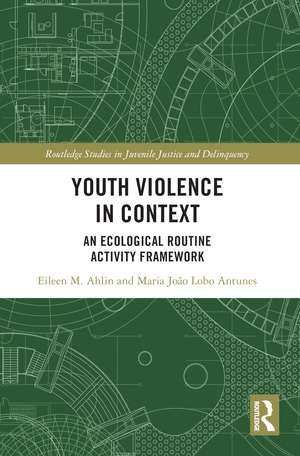Youth Violence in Context: An Ecological Routine Activity Framework: Routledge Studies in Juvenile Justice and Delinquency
Autor Eileen M. Ahlin, Maria João Lobo Antunesen Limba Engleză Paperback – 31 mai 2023
Drawing on scholarship that explores predictors and consequences of youth violence, the authors apply RAT/LS theory to explain how community, family, peers, schools, and youth characteristics influence youth behavior. Each layer of the ecological framework unfolds to reveal the latest scholarship and contextualizes how concepts of RAT/LS, specifically the motivated offender, target suitability, and guardianship, can be applied at each level. This book also highlights the mechanisms and processes that contribute to youth exposure to and involvement in violence by exploring factors examined in the literature as protective and risk factors of youth violence.
Youth violence occurs in context, and, as such, the understanding of multilevel predictors and preventive measures against it can be situated within an RAT/LS ecological framework. This work links theory to extant research. Ahlin and Antunes demonstrate how knowledge of youth violence can be used to develop a robust theoretical foundation that can inform policy to improve neighborhoods and youth experiences within their communities, families, and peers and within their schools while acknowledging the importance of individual characteristics. This monograph is essential reading for those interested in youth violence, juvenile delinquency, and juvenile justice research and anyone dedicated to preventing crime among youths.
| Toate formatele și edițiile | Preț | Express |
|---|---|---|
| Paperback (1) | 362.16 lei 6-8 săpt. | |
| Taylor & Francis – 31 mai 2023 | 362.16 lei 6-8 săpt. | |
| Hardback (1) | 1158.84 lei 6-8 săpt. | |
| Taylor & Francis – 22 sep 2021 | 1158.84 lei 6-8 săpt. |
Preț: 362.16 lei
Preț vechi: 381.21 lei
-5% Nou
Puncte Express: 543
Preț estimativ în valută:
69.30€ • 71.60$ • 57.65£
69.30€ • 71.60$ • 57.65£
Carte tipărită la comandă
Livrare economică 20 martie-03 aprilie
Preluare comenzi: 021 569.72.76
Specificații
ISBN-13: 9781032100838
ISBN-10: 1032100834
Pagini: 176
Ilustrații: 4 Tables, black and white; 12 Line drawings, black and white; 12 Illustrations, black and white
Dimensiuni: 152 x 229 x 10 mm
Greutate: 0.25 kg
Ediția:1
Editura: Taylor & Francis
Colecția Routledge
Seria Routledge Studies in Juvenile Justice and Delinquency
Locul publicării:Oxford, United Kingdom
ISBN-10: 1032100834
Pagini: 176
Ilustrații: 4 Tables, black and white; 12 Line drawings, black and white; 12 Illustrations, black and white
Dimensiuni: 152 x 229 x 10 mm
Greutate: 0.25 kg
Ediția:1
Editura: Taylor & Francis
Colecția Routledge
Seria Routledge Studies in Juvenile Justice and Delinquency
Locul publicării:Oxford, United Kingdom
Public țintă
Postgraduate and UndergraduateCuprins
Preface; 1. Understanding the two types of violence; 2. Ecological framework and theoretical perspectives of youth violence; 3. Community; 4. Family; 5. Peers and school; 6. Youth characteristics and the individual; 7. Applicability of routine activity theory/lifestyles perspective to youth violence
Notă biografică
Dr. Eileen M. Ahlin is Associate Professor of Criminal Justice at Penn State Harrisburg. She uses an ecological framework to study violence to identify policies and practices that address risk and protective factors of youth violence among informal and formal social controls. Her work spans the community and institutional corrections. She was named a 2016 W.E.B. Du Bois Fellow by the National Institute of Justice, when she and Dr. Maria João Lobo Antunes were awarded a grant to examine how residential mobility influences violence among marginalized populations. Her recent research appears in Journal of Interpersonal Violence, Aggression and Violent Behavior, Race and Justice, and The Prison Journal. She is author or co-author of several books and edited volumes, including Taking Problem-Solving Courts to Scale: Diverse Applications of the Specialty Court Model (2021, Lexington), The Veterans Treatment Court Movement: Striving to Serve Those Who Served (2018, Routledge), and Rethinking America’s Correctional Policies: Commonsense Choices from Uncommon Voices (2017, Lexington). In 2020, Dr. Ahlin was the recipient of Penn State Harrisburg’s Excellence in Research and Scholarly Activity Award.
Dr. Maria João Lobo Antunes is an Assistant Professor in the Department of Sociology, Anthropology & Criminal Justice at Towson University. She is a quantitative criminologist with specializations in juvenile delinquency and exposure to crime, immigrants and criminal justice, and the nexus of neighborhoods, parenting, and youth behaviors. Together with Dr. Eileen Ahlin, she is a 2016 recipient of the National Institute of Justice’s W. E. B. Du Bois Fellowship which focused on the how inner-city mobility influences minority and immigrant youth delinquency. Her most recent scholarship can be seen in Journal of Research in Crime and Delinquency, Feminist Criminology, Aggression and Violent Behavior, Youth Violence and Juvenile Justice, and Journal of Youth and Adolescence.
Dr. Maria João Lobo Antunes is an Assistant Professor in the Department of Sociology, Anthropology & Criminal Justice at Towson University. She is a quantitative criminologist with specializations in juvenile delinquency and exposure to crime, immigrants and criminal justice, and the nexus of neighborhoods, parenting, and youth behaviors. Together with Dr. Eileen Ahlin, she is a 2016 recipient of the National Institute of Justice’s W. E. B. Du Bois Fellowship which focused on the how inner-city mobility influences minority and immigrant youth delinquency. Her most recent scholarship can be seen in Journal of Research in Crime and Delinquency, Feminist Criminology, Aggression and Violent Behavior, Youth Violence and Juvenile Justice, and Journal of Youth and Adolescence.
Descriere
This book examines how protective and risk factors associated with two distinct types of youth violence—exposure to and engagement in violence—are nested within four layers of the ecological framework: community, family, peers, and youth characteristics.





